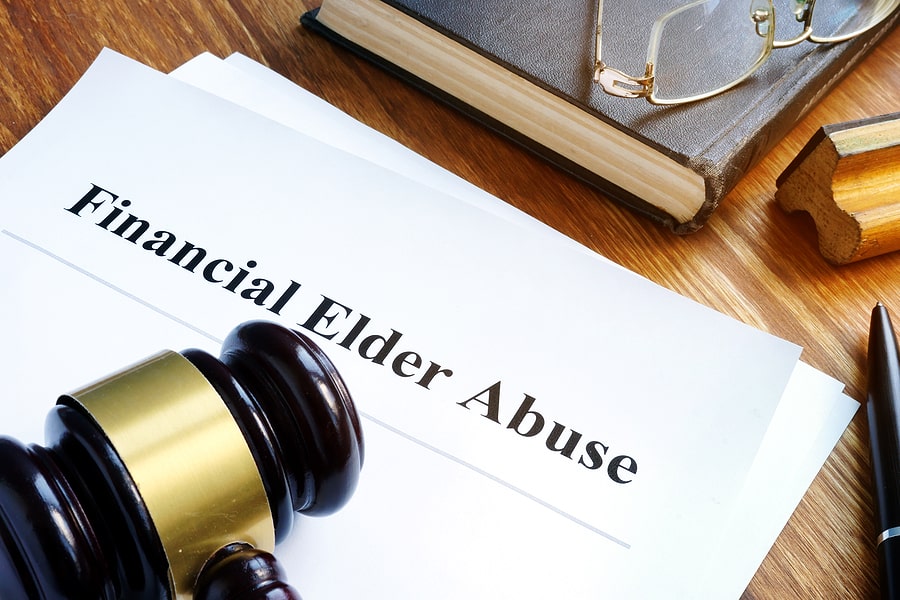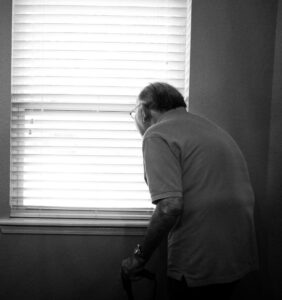
Seniors are especially vulnerable to being taken advantage of financially. Such abuse can happen at the hands of any number of different people, including those who have gained the senior’s trust. The result could defraud your loved one and leave your family without the money that they are counting on in the future.
Financial Abuse Often Goes Undetected and Unreported
The true extent of financial abuse is not really known. Some statistics paint a dire picture of the situation facing our nation’s seniors as they struggle to handle their finances when their capacities may be declining. However, what is truly frightening is that many cases of financial abuse go unreported.
Reasons why authorities may never gain knowledge of financial abuse include:
- The senior discovers the financial abuse but does not realize it is a criminal matter they should report
- The senior is aware of what is happening but is too embarrassed to report the issue.
- The family or the senior may simply never realize what happened to them
If you don’t know whether you or your loved one was the victim of financial abuse, always have an elder abuse lawyer review what happened.
Seniors Lose up to $40 Billion Each Year to Financial Abuse
Reports are that the number of financial abuse cases is growing as the American population ages. There are some estimates that approximately $2.6 billion is lost each year to elder financial abuse. However, that number reflects only discovered cases of financial abuse. Since most cases are unreported or undiscovered, the actual amount lost to elder financial abuse could approach $40 billion. In the age of identity fraud, the problem is only getting worse.
Even banks are reporting that their older customers are at an increased risk of financial exploitation. Banks file Suspicious Activity Reports (SAR) when they spot questionable financial activity. They file SARs with the Financial Crimes Enforcement Network. These SARs quadrupled over five years.
The CFPB Reports About Financial Abuse
The Consumer Financial Protection Bureau, in a recent report analyzing reported cases of elder financial exploitation, found:
- The average loss in the reports of suspicious activity exceeded $40,000.
- When the victim knew the perpetrator, the average loss was higher than $50,000.
- Beyond a report to FinCEN, much of the suspicious financial activity goes unreported, meaning adult protective services and law enforcement do not know what happened.
All of this paints a disturbing picture of a senior population that is increasingly at risk of financial abuse. Both low-tech and high-tech schemes place their assets and property at greater risk.
Nursing Homes Must Be Free of Financial Abuse
To understand how financial abuse affects seniors, you must first know about their rights in nursing home facilities. Federal nursing home regulations require that nursing home residents live in an environment free of abuse, exploitation, and neglect. One of the prohibited forms of abuse is financial abuse.
Nursing homes must immediately report any type of abuse of their resident to the relevant state authorities within a very short time. Not only may the nursing home be fined for failing to prevent this type of abuse, but the senior’s family can also sue them in a civil lawsuit seeking financial compensation. Often, the nursing home can be liable for far more than the resident lost.
How Does the Law Define Financial Abuse?
Federal law gives a precise definition of financial abuse.
In 2006, Congress passed the Older Americans Act, which defined financial abuse as:
“The fraudulent or otherwise illegal, unauthorized, or improper act or process of an individual, including a caregiver or fiduciary, that uses the resources of an older individual for monetary or personal benefit, profit, or gain, or that results in depriving an older individual of rightful access to, or use of, benefits, resources, belongings, or assets.”
This is a very broad definition of financial abuse. Anyone who takes advantage of an older person could commit financial abuse, whether they took the person’s money or property. While most financial abuse cases involve something illegal, anything done without the senior’s permission can be abuse. Always have an elder abuse lawyer review what happened and your legal rights.
The Different Forms of Financial Abuse
 Within this definition, financial abuse can take on different forms. Seniors and nursing home residents are in a particularly vulnerable position. Often, they depend on someone else for their care, allowing the caregiver power and control over the person they are helping.
Within this definition, financial abuse can take on different forms. Seniors and nursing home residents are in a particularly vulnerable position. Often, they depend on someone else for their care, allowing the caregiver power and control over the person they are helping.
Added to this vulnerability is the fact that many nursing home residents suffer from some sort of cognitive decline. Over half of nursing home residents have some form of dementia or cognitive decline. Even seniors who are not in nursing homes may struggle to manage their own finances and track their own accounts as technology has made things more complicated. Many simply cannot handle their finances as they did years ago.
Many people are in a position to commit financial abuse. Besides family, the biggest risk to the senior comes from a caregiver. Caregivers often have the largest presence in the senior’s life and the most power over them. They also have access to the senior’s home or room and can take their personal papers.
An overview of different types of financial abuse follows to better illustrate how the elder are vulnerable.
Theft of Property
Even if small, theft of property can be considered financial abuse. The senior’s property is a resource of which they are being deprived by the abuser. Nursing home residents are particularly vulnerable to theft from their rooms. They are not always in the best position to keep track of their property, especially when numerous people come in and out of their room every day.
Combine this vulnerability with a large population in the facility, and residents could be at risk of having their possessions taken. The theft can range from something inexpensive to an expensive item of clothing to money or jewelry. Any kind of theft is abuse. Nursing homes need to secure their facility and screen their employees to make sure that the senior has the right to enjoy their own property in their own rooms.
Seniors can become very attached to their possessions. Even the theft of something that seems small can have a very large emotional impact on a nursing home resident. Theft can cause them physical problems such as anxiety and a refusal to participate in daily activities.
Pressure to Change Wills
The caregiver may try to take advantage of the senior who relies on them for practically all of their activities of daily life. Some caregivers may try to take advantage of the power that they have by pressuring the senior to change their will to write out family members and include the caregiver. Caregiver pressure can occur both inside and outside of nursing homes.
The problem with this type of financial abuse is that many families may not even realize they were exploited until after their loved one dies and they read the new will. They then must challenge the will, citing the undue influence that the caregiver had over their loved one.
Pressure to Sign Contracts
Even if someone manipulates the senior into changing their will, there could be other types of financial pressure. The abuser could trick or cajole the senior into signing some other type of agreement, something as simple as having them sign something on their behalf or coercing the senior into buying them something. In more severe cases, the abuser could manipulate the resident into guaranteeing some type of debt or cosigning a loan.
This form of financial abuse requires a lot of work by the family afterward to get out from under its effects. The good news is that if the senior lacks capacity to enter into a contract, the family can generally break the agreements. However, it may take months or years of effort and working with an elder abuse attorney to get out of these contracts. Nonetheless, the abuser can inflict a great deal of damage before the discovery of the abuse.
Other Types of Financial Coercion
People with power over the senior may pressure them to lend or give them money. Seniors may be afraid to disappoint the person on whom they rely. With declining capacity, the resident might have the ability to resist the pressure, especially when it comes frequently. This coercion may seem harmless at first, but the frequent demands could eventually wear a senior down.
This type of financial abuse is even worse when combined with neglect. Caregivers may threaten to withhold crucial care if the senior does not give them what they want. The elderly are very susceptible to this type of extortion when they depend on nursing home staff to change them and even take them to the toilet. These threats often wear a nursing home resident down over time.
Fraudulently Cashing Checks
Nursing home residents or other seniors may have paperwork or checks lying around in their rooms or homes. When others have access to their papers, they may take the checks and cash them for themselves. Caregivers may also commit benefits fraud, finding a way to take benefits for themselves.
Even though the government deposits Social Security checks automatically, abusers may find a way to access the senior’s bank account to take the money. They could also steal other checks that come in, such as pension checks and other reimbursements.
Identity Theft
Identity theft is fast becoming the biggest threat to vulnerable seniors no matter where they are. In general, people need to go several steps further as scammers’ methods grow more complex. Seniors often lack that capacity.
Here are some of the common identity theft scams that target seniors:
- Tax fraud – The criminal steals the victim’s Social Security number and files a fraudulent tax return in the victim’s name to get a refund. Tax fraud is easier for the perpetrator when they have access to the resident’s paperwork that has Personally Identifiable Information (PII) on it.
- Phone fraud – A growing area of identity theft, seniors are very vulnerable to phone fraud because they may suffer from loneliness and think that the scammer on the other end of the line is someone to whom they can talk.
- Wire transfer fraud – Someone with access to the senior’s PII or account names and passwords could access their bank account and transfer money to themselves. Again, people with access to the senior’s financial records and paperwork are in a position to pull off this fraud.
- Credit card fraud – Having access to PII, the scammer opens various credit accounts in the senior’s name. The fraudster will then run up large balances in the victim’s name.
This is just a list of some types of financial abuse that occurs. Many things can fit within the broad definition of abuse. Anything that results in someone else depriving your loved one of their money or property can be considered abuse.
Your Options After Discovering Financial Abuse

Nursing Home Abuse Lawyer, David Brauns
If financial abuse happened at a nursing home, the facility might be civilly liable to your family in a lawsuit. If their employee committed the abuse, you could work with a nursing home abuse attorney to file a lawsuit. The facility may be liable, even if it was not their employee who committed the fraud. They must provide their residents with an environment free of abuse and must take reasonable steps to protect the seniors who live there.
Individuals or their families can sue nursing homes for any abuse. If your loved one has suffered a loss, consult with an elder abuse attorney near you to determine how you can hold the nursing home where the abuse happened accountable. Not only can financial abuse form the basis for a lawsuit, but any kind of nursing home abuse is legally actionable.














